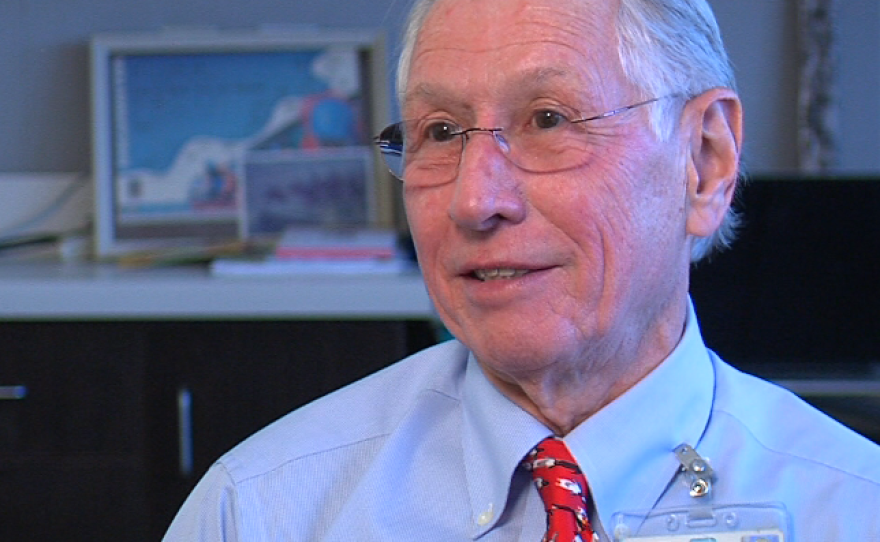When voters passed Proposition 215 in 1996, California became the first state to legalize medical pot. There was only one problem. Scientists still hadn't firmly established marijuana's effectiveness as medicine.
Some state legislators wanted to change that. They approached UC San Diego psychiatrist Igor Grant.
"My recommendation was, look, establish a center to study this," said Grant, who'd previously looked into whether moderate marijuana use causes long-term brain damage (conclusion: it doesn't).
"It'll cost you some money but these studies have not been done before," he told the legislators.
Soon, Grant found himself in charge of the new state-funded Center for Medicinal Cannabis Research.
It was an enviable position. Many scientists in the United States would love to do experiments using pot, but it's been incredibly difficult to study. The Drug Enforcement Administration lists marijuana as a schedule one drug alongside heroin and ecstasy.
It's a category reserved for drugs with "no currently accepted medical use." Grant said his work challenging that assumption wouldn't have been possible without Sacramento fully behind him.
"Without the state of California saying, 'Yes, we support this work,' we probably would've never gotten federal approval," Grant said.
Grant worked with scientists throughout the UC system to complete a series of small human trials. They sourced their samples from the only federally sanctioned grow operation, a pot farm at the University of Mississippi.
"It would be a joint basically," Grant said. "But very professionally rolled, I might say. It looked like a cigarette."
The joints all looked and smelled the same, but not all of them got subjects high. These studies required placebos, so some joints contained no THC, sort of like the pot version of decaf coffee. Grant had to convince DEA agents these samples would not leave the lab.
"The DEA has to come locally and say, 'Where are you going to store it? Let's look at your research pharmacy,'" Grant said. "In one case they said, 'Is that safe bolted to the floor?'"
Subjects smoked their joints in hermetically sealed rooms with no ventilation leading toward non-participants who might unwittingly inhale stray fumes.
Grant and his colleagues had to jump through lots of regulatory hoops to pull off the experiments. But once they were done, the findings surprised him.
"I kind of expected, well, we're going to have a few studies that say yes and a few that will say no, and then at the end of the day we'll still be arguing," Grant said. "But in fact every single study showed benefit."
Grant said it's now well-established that marijuana can soothe neuropathic pain in patients with diseases like HIV/AIDS. It can reduce spasticity in multiple sclerosis. And — perhaps obviously — it can stimulate appetite in underweight patients.
Grant said more research is needed before reaching conclusions about marijuana's usefulness with other diseases, like epilepsy and schizophrenia. He also admits some purported uses have little to no scientific support. But taken altogether, Grant says there's now more than enough evidence to justify rescheduling marijuana.
Other scientists agree. The American Academy of Pediatrics recently called for rescheduling. Even U.S. Surgeon General Vivek Murthy has acknowledged marijuana can be helpful in treating certain conditions.
Alex Kreit, a professor at the Thomas Jefferson School of Law, said learning more about pot will be difficult without rescheduling.
"It makes it very hard for researchers to get access," Kreit said. "There are a whole host of hurdles that schedule one drugs come with, as far as research, that schedule two, three and so forth simply don't have."
DEA spokesperson Rusty Payne said the agency can't reschedule marijuana on its own.
"Until Congress acts or the FDA says it's a medicine, there's nothing we can do," he said.
As for harms, Grant says the jury's out on how marijuana can affect teenage brains still under development. But he's seen no clear evidence of long-term damage in adults.
Grant said, "It's completely incongruous that it's sitting in schedule one with other useless, dangerous drugs."
Grant said marijuana belongs in schedule three, alongside small doses of codeine and some appetite suppressants. But he'd settle for schedule two.







